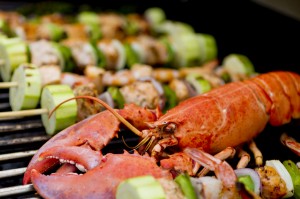Information for Holiday Home Owners Supplying BBQ’s to Guests
 June 2014 was one of the warmest and driest in the past decade, worthy of a blog on BBQ Safety for Holiday Home Owners. Whilst in recent times the words ‘barbecue summer’ have become somewhat synonymous with an unfortunate Met Office prediction of a return to the summer sunshine of yester years only to be followed by one of the wettest summers on record.
June 2014 was one of the warmest and driest in the past decade, worthy of a blog on BBQ Safety for Holiday Home Owners. Whilst in recent times the words ‘barbecue summer’ have become somewhat synonymous with an unfortunate Met Office prediction of a return to the summer sunshine of yester years only to be followed by one of the wettest summers on record.
As we all begin to flock to the end of the garden, desperately trying to take up a position in which we aren’t bellowed by wind driven charcoal smoke, what about your guests?
If you provide a BBQ for those visiting your holiday home its important to ensure it’s use is included within your risk assessment and also well communicated to guests.
Here are a few things for you to consider on BBQ safety for holiday home owners and to communicate to those enjoying your holiday let property:
General BBQ Safety for Holiday Home Owners – When was the last time you checked your Holiday Home BBQ?
- It’s vital to make sure that your holiday home BBQ is checked on a regular basis, and that these checks are carried out more frequently during periods of heightened use.
- Many holiday home owners will have play equipment such as trampolines in their garden. It’s important that there is adequate space between these areas and where your BBQ is situated.
- If your BBQ is usually stored inside, clearly indicate to visitors that it should have cooled completely and cleaned before being stored. Fires can often be started from the embers of a BBQ that has not been sufficiently cooled or extinguished and if they are allowed to continue to burn in a confined space poisonous carbon monoxide can build up and potential kill you or your guests.
- Hot charcoal should never be thrown out immediately after a BBQ as the heat can melt plastic and cause fires.
The frustrations of getting the BBQ going – getting charcoal cooking
- BBQ’s take time and preparation. In a world in which our fan oven can quickly reach 200 Celcius within minutes, it can at times seem frustrating waiting for your charcoal to reach cooking temperatures.
This can lead to the temptation of adding more charcoal to the fire or using accelerants in order to quicken the pace of the process. Guests should only use enough charcoal to cover the base of the BBQ and should never use accelerants such as petrol in order to fuel the fire.
- If your BBQ set included things such as lighters these should only be used on cold coals and also kept well out of the reach of children in your holiday home.
Keeping your holiday home guests safe with gas
- If you supply a gas BBQ for use by your guests this will pose different risks and safety procedures. You should first ensure that your gas cylinders and BBQ are kept in an appropriate place. This should be an area that is not tightly confined and be clearly designated as out of bounds for young guests.
- Whilst we all hope for a long BBQ summer you should avoid keeping more gas than is necessary at your holiday home.
- Guests should be encouraged to change cylinders outdoors or in a well-ventilated area. They should also ensure the tap is fully turned off before making any change.
- If a gas leak is suspected try brushing soapy water around the joint or pipe. If there is an issue bubbles will be visible. Tighten to fix any potential joint but avoid over tightening.
- Guests should be encouraged to report any defaults or defects to your gas BBQ. It should also be checked by someone with the competent skills and experience on a regular basis. Have your gas BBQ serviced annually and safety checked by a Gas Safe registered engineer with the appropriate LPG endorsement.
For further information or if you require a quotation from a specialist for your holiday home insurance call our team on 01237 429444.

